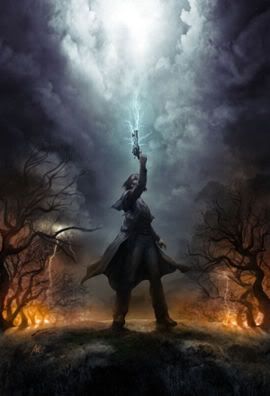
This is Marc Schuster. He teaches English. He edits for Philadelphia Stories. He’s also a writer and knows a thing or two about characters, especially since contemporary short stories (which he lectured about at this past weekend’s Writer’s Conference) are driven by characters, rather than plot. His full thoughts and lecture notes are available here, but allow me to offer a groundling’s perspective.
“To put it bluntly, if we’re going to publish your story, we need to fall in love with it.”
The thing that links one good story to another, that makes a tale worthy of publication and the attention of others, are characters that stick with the audience. Characters shouldn’t just be empty cypher upon whom the author or audience can project themselves (I’m lookin’ at you, Bella Swan). They should have texture. They should have ‘tells’, those little ticks and nuances about them that help a reader identify them instantly, and also makes it possible to beat ’em at poker. On that subject, can you imagine playing poker with a character? Or going out to lunch with them? Meeting them in a park to feed the ducks, or having an argument at a train station about the economy? If you answered ‘yes’ to any of these questions, something’s being done right with that character. Don’t hold this back from your reader, either, if you’re writing a character and have pictured any of the previous situations. As much as you might wish to ‘pity’ the reader, in Vonnegut’s words, layering texture into your characters should surprise the reader, prompt them to read more, and help them fall in love with your characters.
“The character can’t simply serve as a pawn in the larger game of the narrative.”
We all like playing puppet-master as we write. Then again, maybe that’s just me. I might be a little unfeeling or even sadistic when I inflict tragedy or pain upon my characters, but in doing so I don’t intend to make that pain part of a ride on rails. I want my characters to react to getting hurt, to making a discovery, to being kissed. I might plot things out in a sketch, outline or diagram, but one thing I avoid plotting, if I can, is the reaction a character is going to have to an event. By letting the reaction flow out of the description of the complication, the character grows organically. My hope is that taking this tack helps my character become three-dimensional, an actual person, instead of just a cardboard cutout that looks nice depending on how they’re described.
This especially comes into play where a character’s flaws are concerned. Provided you’re concerned with character development, you’ll want your characters to have things they need to overcome or desire to change about themselves. Our flaws make us human, and they’ll do the same for your characters. Just like you should dare to surprise your audience with a character’s texture, dare to write about something you or someone else would be afraid to reveal.
“Remember, the last thing you want any reader to think at any point in your story is, ‘Who cares?'”
This was something I carried with me when I entered discussions of Citizen in the Wilds. I didn’t want to focus overmuch on the fantasy setting. I felt my primary question, were I on the receiving end of my synopsis, should not be “what makes this fantasy book so cool I have to read it?”, but rather “who are these people and why should I care?” I’ve shied away from descriptions, partially because it’s just a first draft and all I want to do is get the plot down on paper, but also because of something Marc pointed out:
Writing should advance the plot or develop the characters. Everything else is superfluous.
Now, being that Acradea’s a new world, more or less, fleshing out some concepts like how human magic works or what some of the creatures look, sound and smell like is going to be inevitable. But more often than not, I want to be either telling people more about the characters or moving them from one situation to the next. I’ve felt pangs of fear as I’ve written one conversation or another, afraid that the book might be becoming too ‘talky’ and not have enough action. But if I need more action, I can put it in. The conversations are important, because they involve the characters. If I lost track of a conversation’s through-line I’ll drop it. There’s a reason the good Lord invented the Delete key.
So yeah. This was good stuff. One of the highlights of the conference. Marc is a generous, smart and personable man, and I’m glad he was willing to share these lessons with us.






